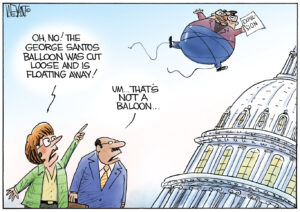Republicans Truly Have No Idea What They Want to Accomplish in Congress
What we're seeing is not just a bit of sputtering before the GOP machine cranks up and begins to systematically fulfill its governing plan. There is no plan. Shutterstock
Shutterstock
Shutterstock
WASHINGTON — It’s been just a few weeks since Republicans took full control of Congress, but already it is safe to say they have no earthly idea of what they want to accomplish.
What we’re seeing is not just a bit of sputtering before the GOP machine cranks up and begins to systematically fulfill its governing plan. There is no plan. Republican majorities in both the House and Senate are so out of control that they’ve managed a feat once thought impossible: They make the Democratic Party look like a model of unity and discipline.
House Speaker John Boehner has never really been in charge of his caucus. But Senate Majority Leader Mitch McConnell was supposed to be a masterful orchestrator, a consummate dealmaker, a skillful herder of cats. So far, he is looking, well, kind of Boehneresque.
McConnell should be deeply embarrassed that a mere freshman, Sen. Tom Cotton, R-Ark., could invite widespread ridicule by convincing 46 of his colleagues (including McConnell himself) to sign a dangerously inappropriate letter to the leaders of the Islamic Republic of Iran. At once bellicose and patronizing, the letter threatens to undo any agreement President Obama may reach on limiting the Iranian nuclear program.
It is one thing for a rookie senator, perhaps impressed with his new status, to decide he can barge into sensitive international negotiations that are clearly the president’s to conduct. But to convince so many others to go along with such a bad idea suggests a disturbing lack of adult supervision.
Predictably, Senate Republicans who signed Cotton’s missive have had to spend days explaining why. The better question, in my view, is how: Specifically, how could McConnell allow his majority to be hijacked in this manner?
Not that McConnell showed any greater ability to control events during the long and pointless fight over funding for the Department of Homeland Security. Senate Democrats remained united throughout — and, in the end, Republicans who had hoped to reverse Obama’s executive actions on immigration had to capitulate. McConnell, a master of the Senate’s arcane procedures, was reduced to complaining about how the mean old Democrats were using the rules to get their way.
Did McConnell allow the scenario to play out as a way of teaching House Republicans the limits of their power? If so, it was a triumph of hope over experience. We’ve seen this movie again and again, and it always ends the same way: with the House leadership apparently shocked to learn it takes 60 votes to get anything done in the Senate.
For all the post-election talk about how the GOP was going to show the nation it is capable of governing, by now it is clear that many Republicans in Congress do not share this goal.
Since Republicans do not hold the White House or veto-proof majorities in either chamber, governing requires compromise. Refusing to make the compromises needed to pass mandatory legislation, such as budget appropriations, leads to self-inflicted wounds such as government shutdowns for which Congress is blamed. These are not difficult concepts to grasp.
Yet many House Republicans — either for ideological reasons or because they fear inviting a primary challenge from the right — will not compromise at all. They find it more advantageous or satisfying to vote 50-plus times to repeal all or part of Obamacare, knowing they have no chance of succeeding, rather than look for ways to make the program work better for their constituents.
That explains Boehner’s ineffectiveness. But what about McConnell’s? Why hasn’t he taken the reins?
One reason is the number of Republican senators who are thinking about running for president. Opposition to Obama — rather than any set of ideas, values or principles — is the party’s North Star. So if a letter that seeks to torpedo the president’s Middle East policy is circulating in the Senate cloakroom, anyone thinking about the Iowa caucuses is going to sign on.
Another reason might be that McConnell is simply a better counterpuncher than initiator. Or perhaps he just needs to rethink his approach. His failure to get a single Democrat to defect on the Homeland Security votes should convince him that if he is going to be effective in leading the Senate, something’s going to have to change.
As things stand, it is possible to argue that the most capable field marshals in Congress are Senate Minority Leader Harry Reid and House Minority Leader Nancy Pelosi. Which makes you wonder just what in the world the Republican Party thinks it might be accomplishing.
Eugene Robinson’s email address is [email protected].
© 2015, Washington Post Writers Group
Your support matters…Independent journalism is under threat and overshadowed by heavily funded mainstream media.
You can help level the playing field. Become a member.
Your tax-deductible contribution keeps us digging beneath the headlines to give you thought-provoking, investigative reporting and analysis that unearths what's really happening- without compromise.
Give today to support our courageous, independent journalists.






You need to be a supporter to comment.
There are currently no responses to this article.
Be the first to respond.